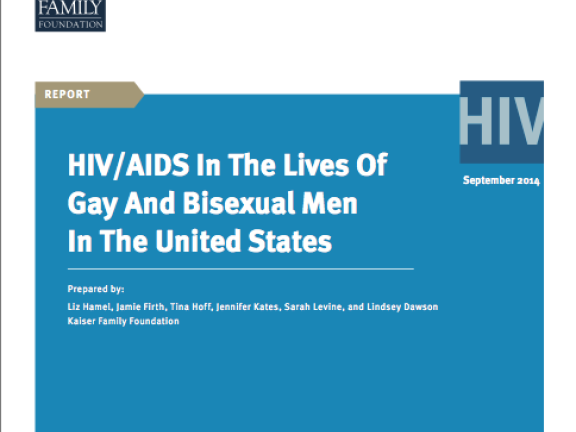Published October, 2014
HIV/AIDS In The Lives Of Gay And Bisexual Men In The United States, Liz Hamel, Jamie Firth, Tina Hoff, Jennifer Kates, Sarah Levine & Lindsey Dawson, The Henry J. Kaiser Family Foundation (2014)

This national survey of gay and bisexual men in the United States finds that while HIV is named as the number one health issue facing this population, a majority of gay and bisexual men (56%) are not personally concerned about becoming infected, and relatively few report having been tested recently. Kaiser Family Foundation President Drew Altman says the results “underscore the importance of getting the word out among gay and bisexual men about risk and new treatment and prevention options.”
Among the survey findings:
· Only 30% of gay and bisexual men who do not self-identify as HIV positive say they were tested for HIV within the last year.
· Only 26% know about PrEP (pre-exposure prophylaxis), a daily pill that people who are HIV negative can take to lower their risk of becoming infected.
· Fewer than half are aware that the current guidelines for people living with HIV are to start antiretroviral (ARV) treatment as soon as they are diagnosed and only 25% know about treatment as prevention.
· More than half say that a doctor has never recommended getting tested for HIV and 61% say they rarely or never discuss HIV when they visit their doctor.
· Just 32% realize that new HIV infections are on the rise among gay and bisexual men.
· Overall, 75% say that gay and bisexual men not knowing their HIV status is a major reason it has been hard to control the spread of HIV among gay and bisexual men.
· Majorities also named complacency about HIV in the gay community and HIV-related stigma as major factors.
Reflecting the disproportionate impact of HIV in communities of color, gay and bisexual men who are members of racial and ethnic minority groups are more likely to say that HIV is a significant issue for them personally than white gay men and that they are personally concerned about becoming infected.
Copyright Information: CHLP encourages the broad use and sharing of resources. Please credit CHLP when using these materials or their content. and do not alter, adapt or present as your work without prior permission from CHLP.
Legal Disclaimer: CHLP makes an effort to ensure legal information is correct and current, but the law is regularly changing, and the accuracy of the information provided cannot be guaranteed. The legal information in a given resource may not be applicable to all situations and is not—and should not be relied upon—as a substitute for legal advice.